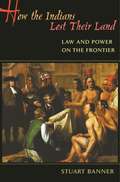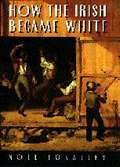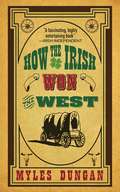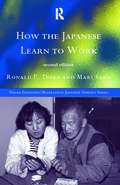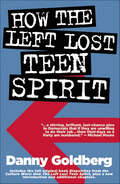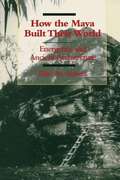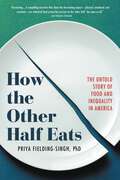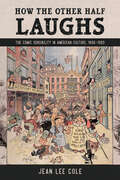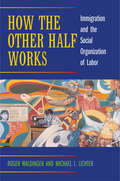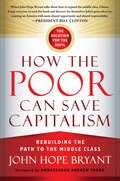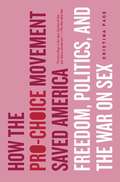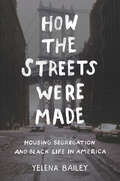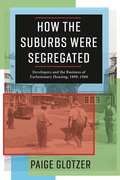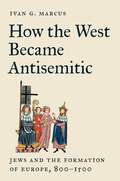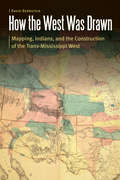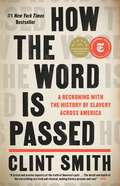- Table View
- List View
How the Indians Lost Their Land: Law and Power on the Frontier
by Stuart BannerBetween the early seventeenth century and the early twentieth,nearly all the land in the United States was transferred from AmericanIndians to whites. This dramatic transformation has been understood in two very different ways--as a series of consensual transactions, but also as a process of violent conquest. Both views cannot be correct. How did Indians actually lose their land? Stuart Banner provides the first comprehensive answer. He argues that neither simple coercion nor simple consent reflects the complicated legal history of land transfers. Instead, time, place, and the balance of power between Indians and settlers decided the outcome of land struggles. As whites' power grew, they were able to establish the legal institutions and the rules by which land transactions would be made and enforced. This story of America's colonization remains a story of power, but a more complex kind of power than historians have acknowledged. It is a story in which military force was less important than the power to shape the legal framework within which land would be owned. As a result, white Americans--from eastern cities to the western frontiers--could believe they were buying land from the Indians the same way they bought land from one another. How the Indians Lost Their Land dramatically reveals how subtle changes in the law can determine the fate of a nation, and our understanding of the past.
How the Irish Became White
by Noel IgnatievOne way to be white, according to Ignatiev (history, Massachusetts College of Art) is to make sure nobody thinks you are Black. Ignatiev, also well known as a co-founder of the journal Race Traitor, notes that the Irish fled a homeland under foreign occupation and a caste system that reduced them to the lowest form of humanity. When they came to America they found their identity was defined instead by the color of their skin. Quickly, the oppressed became the oppressors and the new Irish immigrants proved they could be more brutal in their oppression of African Americans than those who had come before, with the Irish Protestant Ascendancy serving as role models. Published in 1995 and a source of controversy ever since, this is a significant part of Ignatiev's stated agenda to abolish the white race. Annotation ©2009 Book News, Inc., Portland, OR (booknews.com)
How the Irish Won the West
by Myles DunganHere is the full story of the Irish immigrants and their decedents whose hard work helped make the West what it is today. Learn about the Irish members of the Donner party, forced to consume human flesh to survive the winter; mountain men like Thomas Fitzpatrick, who discovered the South Pass through the Rockies; Ellen "Nellie" Cashman, who ran boarding houses and bought and sold claims in Alaska, Arizona, and Nevada; and Maggie Hall, who became known as the "whore with a heart of gold." A fascinating and entertaining look at the history of the American West, this book will surprise many and make every Irish American proud.
How the Japanese Learn to Work (Nissan Institute/Routledge Japanese Studies)
by R. P. Dore Mari SakoJapan is regarded as a world leader in the field of education and training for improved economic performance. Yet success in Japan is often achieved by going against what is regarded as ideal practice elsewhere. This book offers the most comprehensive review available in English of the many facets of Japanese vocational education and training. Covering the system from primary education through to in job-training offered by companies, this book provides a detailed study of current practice giving equal emphasis to formal training in explicitly vocational courses, and informal training in factories, shops and offices.The authors analyse the difference between substantive 'person-changing' training and mere 'ability-labelling.' They raise important questions, such as: To what extent does the need to package skills to provide convenient qualifications distort the actual training given? How efficient is it to rely on professional trainers to certify the acquisition of skills, rather than run separate testing systems? The authors reveal how, in Japanese companies, employees are strongly motivated by pride in the successful execution of their jobs, and that much company training is carried out by colleagues.
How the Left Lost Teen Spirit: (and How They're Getting It Back!)
by Danny GoldbergIncludes Goldberg’s groundbreaking book Dispatches from the Culture Wars, plus a new author introduction and additional chapters.“Danny Goldberg’s memoir contains the powerful reflections of the most progressive activist in the recording industry. His candor, vision and sense of humor is infectious.” —Cornel West“If Lester Bangs and Maureen Dowd had a love child, he’d have written this book.” —Arianna HufflingtonWhen did American government become the enemy of American pop culture?Music insider and progressive activist Danny Goldberg has spent decades tuning in to the rhythms and voices that speak straight to the hearts and desires of America’s youth. In that time, one fact has become increasingly clear: Our venerable political leaders are too often tone deaf. In this startling, provocative book, Goldberg shows how today’s professional public servants have managed to achieve nothing less than the indefensible, wholesale alienation of an entire generation.
How the Maya Built Their World
by Elliot M. AbramsMaya architecture is often described as "massive" and "monumental," but experiments at Copan, Honduras, convinced Elliot Abrams that 300 people could have built one of the large palaces there in only 100 days. In this groundbreaking work, Abrams explicates his theory of architectural energetics, which involves translating structures into volumes of raw and manufactured materials that are then multiplied by the time required for their production and assembly to determine the labor costs of past construction efforts. Applying this method to residential structures of the Late Classic period (A. D. 700-900) at Copan leads Abrams to posit a six-tiered hierarchic social structure of political decision making, ranging from a stratified elite to low-ranking commoners. By comparing the labor costs of construction and other economic activities, he also prompts a reconsideration of the effects of royal construction demands on commoners.
How the Other Half Eats: The Untold Story of Food and Inequality in America
by Priya Fielding-SinghA &“deeply empathetic&” (Publishers Weekly, starred review) &“must-read&” (Marion Nestle) that &“weaves lyrical storytelling and fascinating research into a compelling narrative&” (Chronicle Review) to look at dietary differences along class lines and nutritional disparities in America, illuminating exactly how inequality starts on the dinner plate.Inequality in America manifests in many ways, but perhaps nowhere more than in how we eat. From her years of field research, sociologist and ethnographer Priya Fielding-Singh brings us into the kitchens of dozens of families from varied educational, economic, and ethnoracial backgrounds to explore how—and why—we eat the way we do. We get to know four families intimately: the Bakers, a Black family living below the federal poverty line; the Williamses, a working-class white family just above it; the Ortegas, a middle-class Latinx family; and the Cains, an affluent white family.Whether it's worrying about how far pantry provisions can stretch or whether there's enough time to get dinner on the table before soccer practice, all families have unique experiences that reveal their particular dietary constraints and challenges. By diving into the nuances of these families&’ lives, Fielding-Singh lays bare the limits of efforts narrowly focused on improving families&’ food access. Instead, she reveals how being rich or poor in America impacts something even more fundamental than the food families can afford: these experiences impact the very meaning of food itself.Packed with lyrical storytelling and groundbreaking research, as well as Fielding-Singh&’s personal experiences with food as a biracial, South Asian American woman, How the Other Half Eats illuminates exactly how inequality starts on the dinner plate. Once you&’ve taken a seat at tables across America, you&’ll never think about class, food, and public health the same way again.
How the Other Half Laughs: The Comic Sensibility in American Culture, 1895-1920
by Jean Lee ColeHonorable Mention Recipient for the Charles Hatfield Book PrizeTaking up the role of laughter in society, How the Other Half Laughs: The Comic Sensibility in American Culture, 1895–1920 examines an era in which the US population was becoming increasingly multiethnic and multiracial. Comic artists and writers, hoping to create works that would appeal to a diverse audience, had to formulate a method for making the “other half” laugh. In magazine fiction, vaudeville, and the comic strip, the oppressive conditions of the poor and the marginalized were portrayed unflinchingly, yet with a distinctly comic sensibility that grew out of caricature and ethnic humor.Author Jean Lee Cole analyzes Progressive Era popular culture, providing a critical angle to approach visual and literary humor about ethnicity—how avenues of comedy serve as expressions of solidarity, commiseration, and empowerment. Cole’s argument centers on the comic sensibility, which she defines as a performative act that fosters feelings of solidarity and community among the marginalized. Cole stresses the connections between the worlds of art, journalism, and literature and the people who produced them—including George Herriman, R. F. Outcault, Rudolph Dirks, Jimmy Swinnerton, George Luks, and William Glackens—and traces the form’s emergence in the pages of Joseph Pulitzer’s New York World and William Randolph Hearst’s Journal-American and how it influenced popular fiction, illustration, and art. How the Other Half Laughs restores the newspaper comic strip to its rightful place as a transformative element of American culture at the turn into the twentieth century.
How the Other Half Lives (The Bedford Series in History and Culture #110)
by Jacob A. RiisJacob Riis's famed 1890 photo-text addressed the problems of tenement housing, immigration, and urban life and work at the beginning of the Progressive era. David Leviatin edited this complete edition of How the Other Half Lives to be as faithful to Riis's original text and photography as possible. Uncropped prints of Riis's original photographs replace the faded halftones and drawings from photographs that were included in the 1890 edition. Related documents added to the second edition include a stenographic report of one of Riis's lantern-slide lectures that demonstrates Riis's melodramatic techniques and the reaction of his audience, and five drawings that reveal the subtle but important ways Riis's photographs were edited when they were reinterpreted as illustrations in the 1890 edition. The book's provocative introduction now addresses Riis's ethnic and racial stereotyping and includes a map of New York's Lower East Side in the 1890s. A new list of illustrations and expanded chronology, questions for consideration, and selected bibliography provide additional support.
How the Other Half Lives: Studies among the Tenements of New York (Second Edition) (The Bedford Series in History and Culture)
by Jacob A. RiisJacob Riis's famed 1890 photo-text addressed the problems of tenement housing, immigration, and urban life and work at the beginning of the Progressive era. David Leviatin edited this complete edition of How the Other Half Lives to be as faithful to Riis's original text and photography as possible. Uncropped prints of Riis's original photographs replace the faded halftones and drawings from photographs that were included in the 1890 edition. Related documents added to the second edition include a stenographic report of one of Riis's lantern-slide lectures that demonstrates Riis's melodramatic techniques and the reaction of his audience, and five drawings that reveal the subtle but important ways Riis's photographs were edited when they were reinterpreted as illustrations in the 1890 edition. The book's provocative introduction now addresses Riis's ethnic and racial stereotyping and includes a map of New York's Lower East Side in the 1890s. A new list of illustrations and expanded chronology, questions for consideration, and selected bibliography provide additional support.
How the Other Half Works
by Michael I. Lichter Roger WaldingerHow the Other Half Works solves the riddle of America's contemporary immigration puzzle: why an increasingly high-tech society has use for so many immigrants who lack the basic skills that today's economy seems to demand. In clear and engaging style, Waldinger and Lichter isolate the key factors that explain the presence of unskilled immigrants in our midst. Focusing on Los Angeles, the capital of today's immigrant America, this hard-hitting book elucidates the other side of the new economy, showing that hiring is finding not so much "one's own kind" but rather the "right kind" to fit the demeaning, but indispensable, jobs many American workers disdain.
How the Ox Star Fell from Heaven
by Lily T. Hong Ann FayA Chinese folk tale which explains why the ox was banished from heaven to become the farmer's beast of burden.
How the Pershore Plum Won the Great War
by Maggie Andrews Jenni WaughThe First World War was won not just on the battlefields but on the Home Front, by the men, women and children left behind. This book explores the lives of the people of Pershore and the surrounding district in wartime, drawing on their memories, letters, postcards, photographs, leaflets and recipes to demonstrate how their hard work in cultivating and preserving fruit and vegetables helped to win the Great War. Pershore plums were used to make jam for the troops; but ensuring these and other fruits and vegetables were grown and harvested required the labour of land girls, Boy Scouts, schoolchildren, Irish labourers and Belgian refugees. When submarine warfare intensified, food shortages occurred and it became vital for Britain to grow more and eat less food. Housewives faced many challenges in feeding their families and so in 1916 the Pershore Women’s Institute was formed, providing many women with practical help and companionship during some of Britain’s darkest hours in history.
How the Pill Changes Everything: Your Brain on Birth Control
by Sarah E HillTHE PILLChanges your brainAlters your stress responseCan increase your risk of depressionAffects your choice of mate selectionHormonal birth control is taken by millions of women around the world every day. Yet until recently we knew very little about how the Pill affects the non-reproductive systems of the female body, because research on these other systems was conducted almost exclusively on men. In her trailblazing book, Dr Sarah Hill uses the latest science to reveal how the Pill is changing women and the world, for better and worse. She puts the power back in your hands to make smarter, more informed choices about your health and your hormones.IT'S EVERYTHING YOUR DOCTOR NEVER TOLD YOU
How the Pill Changes Everything: Your Brain on Birth Control
by Sarah E Hill'It's time for all of us to join together to ask science for some new choices and for more information about what happens to us with the choices we have. We shouldn't have to change who we are to protect ourselves from pregnancy, and we should know enough about how our own bodies work to recognize that this is exactly what we're doing when we go on the birth control pill' Hormonal contraception is something most women will use at some point during their life. But the reach of the pill goes far beyond the small number of targeted effects we take it for. It affects almost every system in our body.Column inches and anecdotal conversations prove there are many questions about the pill and its effects yet until now we have known very little about. In this trailblazing book expert psychologist Dr Hill reveals the latest science on the pill, and how it's changing women and the world, for better and for worse. Dr Hill examines cutting-edge research, some of it conducted in her own lab, that shows how the pill affects everything from stress response to autoimmune disorders, mate selection to declining levels of male achievement. Some of her findings are shocking, others will simply verify things you suspected for a long time, but figured were all in your head. Dr Hill signals a rallying cry for better science - for too long women have been understudied as research subjects. Their cycles are more complicated, it's more expensive to do research on them, and scientists are under so much pressure to publish that it's often easier to just use a largely male testing pool, or one that ignores important factors for women. This is your Brain on Birth Control will open your eyes and put you in a position of power. It provides the latest science so that you can understand the risks, weigh up the costs and make smarter, more informed choices about your health and hormones.
How the Poor Can Save Capitalism: Rebuilding the Path to the Middle Class
by John Hope BryantJohn Hope Bryant, successful self-made businessman and founder of the nonprofit Operation HOPE, says business and political leaders are ignoring the one force that could truly re-energize the stalled American economy: the poor. If we give poor communities the right tools, policies, and inspiration, he argues, they will be able to lift themselves up into the middle class and become a new generation of customers and entrepreneurs. Raised in poverty-stricken, gang-infested South Central Los Angeles, Bryant saw firsthand how our institutions have abandoned the poor. He details how business loans, home loans, and financial investments have vanished from their communities. After decades of deprivation, the poor lack bank accounts, decent credit scores, and any real firsthand experience of how a healthy free enterprise system functions. Bryant radically redefines the meaning of poverty and wealth. (It's not just a question of finances; it's values too.) He exposes why attempts to aid the poor so far have fallen short and offers a way forward: the HOPE Plan, a series of straightforward, actionable steps to build financial literacy and expand opportunity so that the poor can join the middle class. Fully 70 percent of the American economy is driven by consumer spending, but more and more people have too much month at the end of their money. John Hope Bryant aspires to "expand the philosophy of free enterprise to include all of God's children" and create a thriving economy that works not just for the 1 percent or even the 99 percent but for the 100 percent. This is a free enterprise approach to solving the problem of poverty and raising up a new America.
How the Pro-Choice Movement Saved America: Freedom, Politics, and the War on Sex
by Christina PageWith a new preface by the author. In the tradition of Backlash and The Morning After, and in a political climate where Roe v. Wade is in serious jeopardy, a young activist reveals that the Pro-Life Movement’s real agenda is a war on contraception, family planning, and sexual freedom.
How the Sphinx Got to the Museum (How The ... Got To The Museum)
by Jessie HartlandDepicts how the Sphinx was commissioned by the Pharaoh, was built, was rediscovered after centuries and then travelled to New York.
How the Streets Were Made: Housing Segregation and Black Life in America
by Yelena BaileyIn this book, Yelena Bailey examines the creation of "the streets" not just as a physical, racialized space produced by segregationist policies but also as a sociocultural entity that has influenced our understanding of blackness in America for decades. Drawing from fields such as media studies, literary studies, history, sociology, film studies, and music studies, this book engages in an interdisciplinary analysis of the how the streets have shaped contemporary perceptions of black identity, community, violence, spending habits, and belonging. Where historical and sociological research has examined these realities regarding economic and social disparities, this book analyzes the streets through the lens of marketing campaigns, literature, hip-hop, film, and television in order to better understand the cultural meanings associated with the streets. Because these media represent a terrain of cultural contestation, they illustrate the way the meaning of the streets has been shaped by both the white and black imaginaries as well as how they have served as a site of self-assertion and determination for black communities.
How the Suburbs Were Segregated: Developers and the Business of Exclusionary Housing, 1890–1960 (Columbia Studies in the History of U.S. Capitalism)
by Paige GlotzerThe story of the rise of the segregated suburb often begins during the New Deal and the Second World War, when sweeping federal policies hollowed out cities, pushed rapid suburbanization, and created a white homeowner class intent on defending racial barriers. Paige Glotzer offers a new understanding of the deeper roots of suburban segregation. The mid-twentieth-century policies that favored exclusionary housing were not simply the inevitable result of popular and elite prejudice, she reveals, but the culmination of a long-term effort by developers to use racism to structure suburban real estate markets.Glotzer charts how the real estate industry shaped residential segregation, from the emergence of large-scale suburban development in the 1890s to the postwar housing boom. Focusing on the Roland Park Company as it developed Baltimore’s wealthiest, whitest neighborhoods, she follows the money that financed early segregated suburbs, including the role of transnational capital, mostly British, in the U.S. housing market. She also scrutinizes the business practices of real estate developers, from vetting homebuyers to negotiating with municipal governments for services. She examines how they sold the idea of the suburbs to consumers and analyzes their influence in shaping local and federal housing policies. Glotzer then details how Baltimore’s experience informed the creation of a national real estate industry with professional organizations that lobbied for planned segregated suburbs. How the Suburbs Were Segregated sheds new light on the power of real estate developers in shaping the origins and mechanisms of a housing market in which racial exclusion and profit are still inextricably intertwined.
How the Vote Was Won: Woman Suffrage in the Western United States, 1868-1914
by Rebecca MeadUncovers how women in the West fought for the right to voteBy the end of 1914, almost every Western state and territory had enfranchised its female citizens in the greatest innovation in participatory democracy since Reconstruction. These Western successes stand in profound contrast to the East, where few women voted until after the ratification of the Nineteenth Amendment in 1920, and the South, where African-American men were systematically disenfranchised. How did the frontier West leap ahead of the rest of the nation in the enfranchisement of the majority of its citizens?In this provocative new study, Rebecca J. Mead shows that Western suffrage came about as the result of the unsettled state of regional politics, the complex nature of Western race relations, broad alliances between suffragists and farmer-labor-progressive reformers, and sophisticated activism by Western women. She highlights suffrage racism and elitism as major problems for the movement, and places special emphasis on the political adaptability of Western suffragists whose improvisational tactics earned them progress.A fascinating story, previously ignored, How the Vote Was Won reintegrates this important region into national suffrage history and helps explain the ultimate success of this radical reform.
How the West Became Antisemitic: Jews and the Formation of Europe, 800–1500
by Ivan G. MarcusAn examination of how the Jews—real and imagined—so challenged the Christian majority in medieval Europe that it became a society that was religiously and culturally antisemitic in new ways In medieval Europe, Jews were not passive victims of the Christian community, as is often assumed, but rather were startlingly assertive, forming a Jewish civilization within Latin Christian society. Both Jews and Christians considered themselves to be God&’s chosen people. These dueling claims fueled the rise of both cultures as they became rivals for supremacy. In How the West Became Antisemitic, Ivan Marcus shows how Christian and Jewish competition in medieval Europe laid the foundation for modern antisemitism.Marcus explains that Jews accepted Christians as misguided practitioners of their ancestral customs, but regarded Christianity as idolatry. Christians, on the other hand, looked at Jews themselves—not Judaism—as despised. They directed their hatred at a real and imagined Jew: theoretically subordinate, but sometimes assertive, an implacable &“enemy within.&” In their view, Jews were permanently and physically Jewish—impossible to convert to Christianity. Thus Christians came to hate Jews first for religious reasons, and eventually for racial ones. Even when Jews no longer lived among them, medieval Christians could not forget their former neighbors. Modern antisemitism, based on the imagined Jew as powerful and world dominating, is a transformation of this medieval hatred.A sweeping and well-documented history of the rivalry between Jewish and Christian civilizations during the making of Europe, How the West Became Antisemitic is an ambitious new interpretation of the medieval world and its impact on modernity.
How the West Was Drawn: Mapping, Indians, and the Construction of the Trans-Mississippi West (Borderlands and Transcultural Studies)
by David BernsteinHow the West Was Drawn explores the geographic and historical experiences of the Pawnees, the Iowas, and the Lakotas during the European and American contest for imperial control of the Great Plains during the eighteenth and nineteenth centuries. David Bernstein argues that the American West was a collaborative construction between Native peoples and Euro-American empires that developed cartographic processes and culturally specific maps, which in turn reflected encounter and conflict between settler states and indigenous peoples. Bernstein explores the cartographic creation of the Trans-Mississippi West through an interdisciplinary methodology in geography and history. He shows how the Pawnees and the Iowas—wedged between powerful Osages, Sioux, the horse- and captive-rich Comanche Empire, French fur traders, Spanish merchants, and American Indian agents and explorers—devised strategies of survivance and diplomacy to retain autonomy during this era. The Pawnees and the Iowas developed a strategy of cartographic resistance to predations by both Euro-American imperial powers and strong indigenous empires, navigating the volatile and rapidly changing world of the Great Plains by brokering their spatial and territorial knowledge either to stronger indigenous nations or to much weaker and conquerable American and European powers.How the West Was Drawn is a revisionist and interdisciplinary understanding of the global imperial contest for North America’s Great Plains that illuminates in fine detail the strategies of survival of the Pawnees, the Iowas, and the Lakotas amid accommodation to predatory Euro-American and Native empires.
How the Word Is Passed: A Reckoning with the History of Slavery Across America
by Clint SmithThis &“important and timely&” (Drew Faust, Harvard Magazine) #1 New York Times bestseller examines the legacy of slavery in America—and how both history and memory continue to shape our everyday lives. Beginning in his hometown of New Orleans, Clint Smith leads the reader on an unforgettable tour of monuments and landmarks—those that are honest about the past and those that are not—that offer an intergenerational story of how slavery has been central in shaping our nation's collective history, and ourselves. It is the story of the Monticello Plantation in Virginia, the estate where Thomas Jefferson wrote letters espousing the urgent need for liberty while enslaving more than four hundred people. It is the story of the Whitney Plantation, one of the only former plantations devoted to preserving the experience of the enslaved people whose lives and work sustained it. It is the story of Angola, a former plantation-turned-maximum-security prison in Louisiana that is filled with Black men who work across the 18,000-acre land for virtually no pay. And it is the story of Blandford Cemetery, the final resting place of tens of thousands of Confederate soldiers. A deeply researched and transporting exploration of the legacy of slavery and its imprint on centuries of American history, How the Word Is Passed illustrates how some of our country's most essential stories are hidden in plain view—whether in places we might drive by on our way to work, holidays such as Juneteenth, or entire neighborhoods like downtown Manhattan, where the brutal history of the trade in enslaved men, women, and children has been deeply imprinted. Informed by scholarship and brought to life by the story of people living today, Smith's debut work of nonfiction is a landmark of reflection and insight that offers a new understanding of the hopeful role that memory and history can play in making sense of our country and how it has come to be. Winner of the National Book Critics Circle Award for NonfictionWinner of the Stowe Prize Winner of 2022 Hillman Prize for Book Journalism A New York Times 10 Best Books of 2021
How the Working-Class Home Became Modern, 1900–1940 (Architecture, Landscape and Amer Culture)
by Thomas C. HubkaThe transformation of average Americans&’ domestic lives, revealed through the mechanical innovations and physical improvements of their homes At the turn of the nineteenth century, the average American family still lived by kerosene light, ate in the kitchen, and used an outhouse. By 1940, electric lights, dining rooms, and bathrooms were the norm as the traditional working-class home was fast becoming modern—a fact largely missing from the story of domestic innovation and improvement in twentieth-century America, where such benefits seem to count primarily among the upper classes and the post–World War II denizens of suburbia. Examining the physical evidence of America&’s working-class houses, Thomas C. Hubka revises our understanding of how widespread domestic improvement transformed the lives of Americans in the modern era. His work, focused on the broad central portion of the housing population, recalibrates longstanding ideas about the nature and development of the &“middle class&” and its new measure of improvement, &“standards of living.&”In How the Working-Class Home Became Modern, 1900–1940, Hubka analyzes a period when millions of average Americans saw accelerated improvement in their housing and domestic conditions. These improvements were intertwined with the acquisition of entirely new mechanical conveniences, new types of rooms and patterns of domestic life, and such innovations—from public utilities and kitchen appliances to remodeled and multi-unit housing—are at the center of the story Hubka tells. It is a narrative, amply illustrated and finely detailed, that traces changes in household hygiene, sociability, and privacy practices that launched large portions of the working classes into the middle class—and that, in Hubka&’s telling, reconfigures and enriches the standard account of the domestic transformation of the American home.
